New Delhi has often responded to political crises in Kashmir by renewing official and track-II dialogue with separatists. This approach slowly graduated from arbitrary deployment of points-men to appointment of official interlocutors, but without much result. A Kashmir Life report.
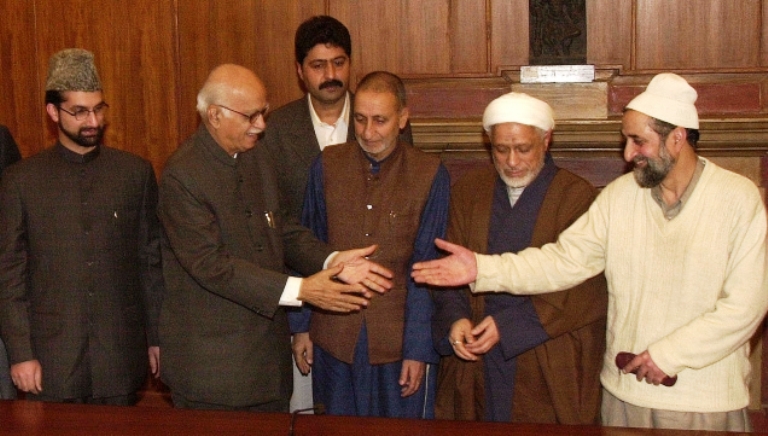
The first contact the Government of India had with Kashmiri separatists was somewhere in a jail, it is believed. That notwithstanding, New Delhi always kept secret channels of communication open with separatist forces, even during the most tenuous times of turmoil and strife in the embattled region.
Traditionally, it is the bureaucratic security establishment that monitors political developments and individuals in Kashmir. This securitised political system of communication has thrown up specialists to play go-betweens for New Delhi and Srinagar. Apart from that there have been a few high ranking individuals who played big roles in helping the two sides communicate during the last twenty years.
During the NDA regime journalist R K Mishra would spend days together in Srinagar, besides many veterans in the media who would fly to Srinagar regularly to “report” on the human rights scenario. Some of them even participated in an occasional protest sit-in as well.
Some high officials were consistent in finding time to contribute in peacemaking. The former boss of RAW, India’s powerful external intelligence organisation, Amarjit Singh Dulat would attend wazwans (traditional Kashmiri cuisine) served at the houses of the Srinagar elite, off the media glare. The J&K cadre former IAS officer Wajahat Habibullah, a close friend of the Gandhi family, has remained continuously engaged in Kashmir and was reported many times to be one of the few working beyond his mandate as a bureaucrat. Wajahat has already written a book on Kashmir and Dulat is reportedly in the process of writing one.

At one stage, New Delhi encouraged setting up of a non-official Kashmir Committee for engaging Kashmiri separatists. Led by lawyer Ram Jethmalani, the committee often went into hibernation. At one point of time it was treated to be a Congress bogey and now it is seen more of a BJP extension. Regardless of the political connections, the Kashmir Committee has had a number of eminent persons as its members. These included M J Akbar, diplomat V K Grover, Jurist and MP F S Nariman, lawyer Ashok Bhan, Shanti Bhushan, Javed Liyaq, Javed Naqvi and journalist Dileep Padgaonkar.
But the government finally decided to have official interlocutors for Kashmir to engage separatists, assess the situation and suggest possibilities of interventions. Starting from K C Pant in 2001 to the trio of interlocutors in 2011, a number of individuals were officially the assigned job of resolving Kashmir.
Since they were appointed to assess a situation that remained unchanged for a long time, most of the assessments also remained almost the same. In fact, the approaches to issues and the possibilities of way-outs suggested by different interlocutors did not vary. Though the recommendations that initial interlocutors K C Pant and N N Vohra made are not in public domain, all others suggested interventions on human rights front and tackling the Armed Forces Special Powers Act – an impunity law still in place.
Prime Minister’s Working Groups appointed by Manmohan Singh reported in detail on various issues and made many recommendations. Most of those recommendations remain on paper but the few that were implemented include a package for migrant Kashmiri Pandits.
The appointment of interlocutors by New Delhi has remained an interesting as well as intriguing aspect of Kashmir management. More interesting is how they studied the situation and made recommendations.
K C Pant

A very experienced politician who deserted Congress for BJP in 1998, Krishna Chandra Pant was appointed Kashmir interlocutor by the then Deputy Prime Minister L K Advani in 2001. His appointment marked the beginning of making interlocution official and public, for the first time by New Delhi. Pant was the Deputy Chairman Planning Commission. In the last week of April when he sent Hurriyat an invitation, the alliance had a prolonged discussion to weigh the offer. Interestingly, when the general council of the conglomerate was in session, a grenade was lobbed at the Hurriyat office.
Eventually, Hurriyat rejected the offer. It said the initiative was aimed at reducing the Kashmir issue to a law and order problem. Hurriyat said unless Kashmir was recognized a dispute, no interlocution will help. Besides, they saw Pant’s appointment as the response of hawks in the government (read Advani) to counter Prime Minister Vajpayee who asserted his government wanted to avoid the beaten path.
Finally, when Pant arrived for a weeklong visit to the state in the last week of May, he had three major appointments in Srinagar. On May 29, had an “informal” meeting with Shabir Shah at his Rawalpora residence. They made differences public and Pant refused point blank that India’s bilateralism with Pakistan is not linked with what New Delhi is talking to Srinagar. Then Pant met Aazam Inquilabi who was driven in a security vehicle to Nehru guesthouse. Pant failed to keep this meeting secret despite Inquilabi’s request.
Former chief minister Ghulam Mohammad Shah met Pant publicly and made a speech to tell him that Kashmir is disputed. Pant also met Mir Qasim, another former chief minister. Only second rung political leaders met him on that visit. Even chief minister Farooq Abdullah was in London with his migrant wife.
Pant later said, “They (Kashmiris) change with the passage of time. Somebody who was a militant ten years ago is not the same today and somebody who was a former Chief Minister now objects to the statement that Jammu and Kashmir is an integral part of India.”
Pant flew to Leh for a day and was greeted by processions seeking a UT status. In Kargil, Pant was told they would live with Kashmir but did not seek secession. In Jammu, there were increasing demands for a separate state. After meeting people – almost everybody from ‘cart-pullers to shikarawallas’, he would address a long news conference in the evening, which was boring to the extent that reporters started skipping it. Pant emphasised on ‘development’ and ‘peace’. Interestingly, he later told reporters, nobody in Kashmir (who met him) sought Azaadi.
Inquilabi and Shah were expelled from Hurriyat. Inquilabi’s assertion that he had taken Prof Abdul Gani Bhat into confidence did not help him. Shah’s insistence that the meeting was informal could not help him either. In return, Pant termed Hurriyat an “obstructionist” that will have to answer its people, one day. Nevertheless, he said his visit was “fruitful and useful.”
What did Pant suggest to the government and what was the follow up? Nothing came into public domain.
N N Vohra
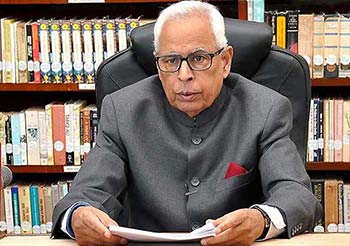 On February 19, 2003 the then Deputy Prime Minister L K Advani chose bureaucrat Narender Nath Vohra from a penal of three, including former RAW chief A S Dulat and K C Pant.
On February 19, 2003 the then Deputy Prime Minister L K Advani chose bureaucrat Narender Nath Vohra from a penal of three, including former RAW chief A S Dulat and K C Pant.
On March 5, Vohra landed in Jammu on a familiarization visit to establish contact with the people he was going to deal in future. On the eve of his visit, Prime Minister Vajpayee told Rajya Sabha that Vohra’s appointment was “a new chapter” and the government would not “repeat the mistakes done in the past” and will make efforts “to find a solution to the problem”.
Finally, Vohra landed in Srinagar on April 22, 2003 for nearly a fortnight-long stay. He had a brief meeting with CPI leader Abdul Rehman Tukroo and later went to see NC president Omar Abdullah who sought explanation from him about his mandate. On day two,
Chief minister Ghulam Mohammad Shah refused to talk to him forcing him to meet his ‘deputy’ Gulam Rasool Wani.
Apart from meeting delegations representing the “interests of different communities” including “prominent citizens and well known intellectuals and editors”, Vohra had a detailed meeting with Commander of the Srinagar based XV corps Lt Gen V G Patankar.
Vohra’s third day in Srinagar was more embarrassing. Shabir Shah refused to talk. Soon after the Hurriyat Conference said they would not interact with him either, because his mission lacked “will and direction” to solve the Kashmir tangle. This spared a lot of time for Vohra to play at the Royal Springs Golf Course.
In between, however, he met BJP and Abdul Khaliq Hanief, a Jamat-e-Islami deserter. During his stay in Srinagar, Vohra was counselled by many political parties including NC leader Ali Mohammad Sagar that he should invite Hurriyat. Vohra, however, asserted that it is up to Hurriyat to meet him.
On day four, he met a number of delegations including that of Congress, Panun Kashmir, Shiromani Akali Dal and a number of NGOs. There was nothing substantial in his meetings during the rest of his visit. Police sources, however, talked about his “disappearances” during early mornings. There were some meetings off the media glare during nights as well.
Nothing much is available about Vohra’s ventures. In one of the cables (Wikileaks) that US ambassador Mulford sent home in 2005, Vohra had said Sardar Abdul Qayoom Khan was being realistic while saying that ‘Azaadi (of Kashmir) is impossible for next 100 years’.
A general impression is that Vohra managed moderates’ meeting with the Deputy Prime Minister.
M Hamid Ansari
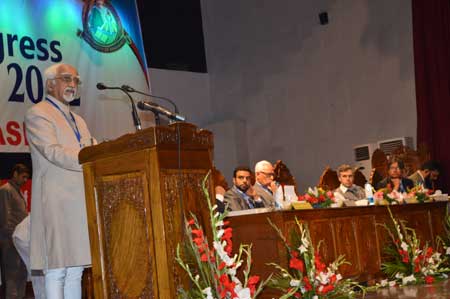
Now the Vice President of the Republic of India, Mohammad Hamid Ansari was appointed to head one of the five Working Groups that was supposed to identify CBMs in J&K.
Set up in May 2006, it was tasked to evolve measures to improve the condition of people affected by militancy, schemes to rehabilitate orphans and widows, relaxations for persons who left militancy, an effective rehabilitation policy, mechanism for the return of youth from PaK and measures to protect and preserve J&K’s unique cultural and religious heritage.
It has two meetings in Jammu and one in Srinagar and submitted its report to the Round Table Conference on April 24, 2007. Its recommendations included handling law and order in J&K through the normal laws and not Armed Forces Special Powers Act and Disturbed Areas Act. It offered specific solutions for the rehabilitation of orphans, widows, and Kashmiri Pandits besides a definite package for those who left militancy.
In order to prevent any reverting back to militancy the group suggested a “definite policy/package” insisting that those who forsworn militancy should be treated with dignity. While security forces should be instructed to “keep a check on fake encounters and fake recovery of arms”, the group sought general amnesty to under trails for minor offences and jailed innocents. Suggesting a careful assessment of number of Kashmiri youth who are willing to return from PaK, the group recommended only those be considered for peaceful return and rehabilitation who joined militancy for misguided ideological reasons, monetary considerations or were forced into militancy.
M K Rasgotra

A former foreign secretary Maharaja Krishna Rasgotra, headed a WG aimed at strengthening relations across LoC by making recommendations for simplification of procedures to facilitate travel, increase goods traffic, expand people-to-people contact, including promotion of pilgrimage and group tourism and opening up of new routes such as Kargil-Skardu. It submitted its report to the RTC in April 2007 after having three meetings in J&K.
This WG suggested a blueprint of the Joint Consultative Group (JCG) between J&K and PaK on issues of trade, culture and environment. Apart from suggesting seven new trans-LoC routes, it had asked for considering opening of a track with China through Ladakh when conditions are conducive. It made only five recommendations.
The JCG envisaged taking 10 lawmakers from each side of the divide who can exchange views periodically on social, economic, cultural and trade related matters besides undertaking consultations for disaster management and relief operations. Apart from JCG on tourism, horticulture and environment, the group suggested a programme for removal of landmines for better utilization of agriculture and grazing lands. It also suggested exchange of students, scholars, journalists and lawyers and unlocking the trans-LoC phone lines – both landline and mobile – that are currently barred on security grounds.
Apart from increasing the frequency of the two trans-LoC buses, the group identified seven more trans-LoC points and suggested that their reopening could be taken unilaterally regardless of the response from PaK and Islamabad. The new routes included Turtuk-Khapula (Ladakh). Turtuk became part of J&K in 1971 Indo-Pak war.
N C Saxena

A former IAS officer who also served in the Planning Commission, N C Saxena headed the working group on good governance. It was supposed to offer effective measures that would increase responsiveness, accountability and transparency in the administration, strengthen local self-government, effectively monitor developmental programmes, institute zero tolerance for human rights violations, strengthen the Right to Information and provide adequate security to all segments of society, particularly the minority communities.
After three meetings, two in Jammu and one in Srinagar, Saxena’s group looked at major success stories from different Indian states and NGOs to calibrate a new system of good governance for J&K.
In order to do away with the “transfer industry”, the group suggested J&K to take a few lessons from Karnataka’s transfer policy and see how best Learning Guarantee Programme (LGP) – a Public Private Partnership initiative with Azim Premji Foundation – can improve the quality of primary education by focusing on learning outcomes.
Saxena’s group suggested a sweeping review of laws, especially revenue laws, a transparent transfer policy, effective system of monitoring developmental projects, strengthening of SHRC and adequate security to minorities besides zero tolerance for human rights violations.
Dr C Rangarajan
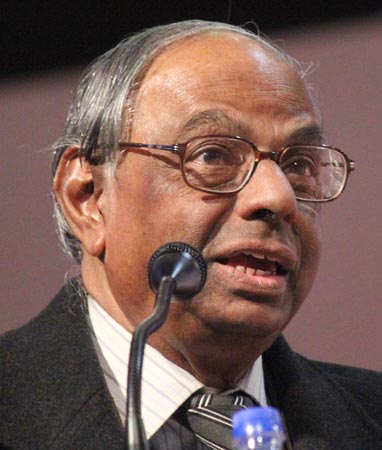
Professional economist who earlier headed RBI, Chakravarthy Rangarajan was appointed as head of the working group on J&K’s economic development to evolve a strategy that ensures balanced sub-regional economic development and employment generation.
After three meetings, it suggested offering J&K projects worth Rs 7947 crores that would become Prime Ministers Reconstruction Plan (II). The package envisaged transferring the just operational 390-MW Dulhasti Power project to the state. It also proposed development projects worth Rs 2300 crores that included Rs 200 crores for Special Industrial Zone (SIZ).
The SIZ was an improvement over the SEZ. “The SIZ will mimic all the physical attributes and governance structures of SEZs but not necessarily their fiscal and statutory dimensions. Like SEZ, the SIZ too will be a large area with world-class infrastructure, captive power generation, high quality services and utilities but will lack tax concessions and export obligations. They will be free to sell in the country or export”, the report explained.
Justice Sagir Ahmad

From New Delhi’s point of view it was the most crucial group tasked to strengthen State-Centre relations and deliberate on matters relating to the special status of J&K within the Union, methods of strengthening democracy, secularism and the rule of law in the state besides effective devolution of powers among different regions to meet regional, sub-regional and ethnic aspirations.
Given the mandate of the group, there was nobody willing to take the assignment. The government initially requested Justice (retd) A M Ahmadi to head the working group. He took his time and rejected the offer. Then the government requested India’s former ambassador to the US Abid Hussain. It was in November 2006 that finally the government roped in Justice (retd) S Saghir Ahmad, a former judge of the apex court who headed J&K High Court in 1993 for almost a year.
It had five meetings and the last one took place in Delhi on September 3, 2007. Justice (died February 1, 2011) held the meeting very casually. In the very first meeting that lasted for five hours, the member said they were disillusioned by the choice of the chairman. “He had not done his home work. When one of the members said 1952 position should be restored, he asked: Yeh Bawan Kya Hai? (What is this 1952)”, one of the participants said. One speaker even stopped his speech and insisted unless he got Justice Sagir’s attention he would not proceed. N N Vohra, who was in that meeting was requesting members that they should avoid annoying him because if he resigns, it will be an embarrassment.
Interestingly, the judge submitted his report to the J&K chief minister and not the prime minister who has head of the RTC had appointed him. In fact he sent a retired J&K cadre IAS officer Ajit Kumar to hand over the report to Omar Abdullah on December 23, 2009. This enabled J&K government to set up a cabinet sub committee to discuss the report. The government is very secretive about the report given the damming recommendations it has made.
The report has suggested settling the fate of Article 370 for good. “It is for the people of the State of Jammu and Kashmir to decide how long to continue Article 370 in its present form and when to make it permanent or abrogate it. The matter being 60 years old, should be settled once for all,” is the very first recommendation Justice Saghir made.
The group suggested a mechanism to review application of the Armed Forces Special Powers Act in order to “explore the possibility of whether the Act can be withdrawn from any part of the state.”
On PDPs self rule idea, the group said its representative (read Muzaffar Hussain Baig) explained orally the concept of ‘Self Rule’ but it “could not be considered in all its detail as the document containing the various aspects of the ‘Self Rule’ were not provided to the Working Group.” Basically, the report says, it appears to relate to ‘Autonomy’ in a wider context, which requires to be considered by the Central Government if and when approached with documents containing specific proposals of the ‘self rule’.”
The working group has rejected the idea of converting Ladakh in UT status, abolishing of state legislative council and disfavoured de-limitation of assembly seats till 2026. It wants strengthening SHRC and supported demand for additional staff to it.
Justice Sagir’s group recommended setting up of a Dogri Channel on the pattern of Kashir Channel for Jammu besides elevating the status of NIT Srinagar to IIT and establishing an IIM in the state.
On the issue of refugees from Pakistan and PoK who settled in parts of Jammu in 1947, 1965 and 1971, Sagir group has recommended implementation of Wadhwa Committee Report. “State Government may provide a limited number of seats to the children of the refugees from West Pakistan in technical institutions and the Government of India may provide employment to them in Central Government offices located in J&K to the extent of 2%”, it said.
Dileep Padgoankar Prof Radha Kumar M M Ansari
At the peak of 2010 unrest that led to more than 120 killings, Home Minister P Chidambaram led an all-party parliamentary delegation to Srinagar in September. It came out with an eight point agenda and one of them was appointing interlocutors – again. Announcing the appointments of the trio on October 13, 2010 after the approval of the panel by CCS, Chidambaram said they would begin the process of “sustained uninterrupted dialogue” with all shades of opinion, especially with youths and students, to resolve the Kashmir problem. He said the move was a clear demonstration of Delhi’s seriousness to find a solution to the Kashmir problem, which has been there “for many, many years”. He said there were no red lines for the interlocutors who have to “chart a course towards a political solution.”
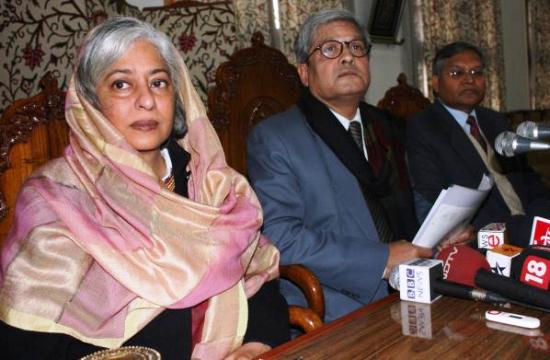
At one point of time, there was an effort to appoint a fourth member to the team with a political background. In fact, chief minister Omar Abdulah has wrote to Home Minister in this regard. But the idea was abandoned, perhaps because the interlocutors had nothing much to dabble with politics.
From day one, the Hurriyat maintained that they would not be talking to the interlocutors. They stuck to their guns. However, Shia cleric Molvi Abbas Ansari had a meeting with them at his old city residence. This forced Hurriyat to show him the door. He retaliated and finally seems to have returned to the fold.
Chidambaram once publicly reprimanded the three Interlocutors for their “ball-by-ball commentary”. “This is interlocution. This is not a cricket match.” Later, they were caught on the wrong foot on the Dr Ghulam Nabi Fai issue that eventually led to squabbles among the trio.
They met 600 delegations in all the 22 districts. They met stone pelters in jails, they got women from all the regions to listen to them and let people know how the division could be extended from geographies, ethnicities and cultures to the genders as well. They also met a congregation of artists and ‘intellectuals’.
They submitted the report on October 12 to the Home Minister. Though not available to media, Chidmabaram wants it should go to the 36 political parties that made the all-party parliamentary delegation.
Reports suggest the trio has called for a review and phased withdrawal of AFSPA, an employment and economic package, Development Councils for equitable development of all three regions of J&K, devolution of powers at grass root level and increasing development activities especially road connectivity. The report has regretted slow pace of expenditure and unfair allocations at regional levels.
There is no mention of pre-1953 position but the report has suggested “meaningful autonomy” within the limits of constitution for all three regions could be considered if the Lok Sabha, Assembly and major political parties accept. A newspaper report suggested the report proposes Article 370 be strengthened.
It remains to be seen if New Delhi wants to make the institution of interlocution as a permanent feature of managing Kashmir from time to time.















